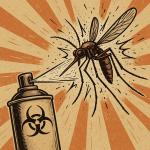There’s a secret about the modern news cycle many people don’t know: Much of it is manufactured by public relations (PR) firms trying to gin up favorable media coverage for their clients.
public health
For many decades, health scares were the purview of environmental NGOs trying to convince voters or politicians to ban some perfectly safe and widely used chemical.
Join Cameron English and Dr. Chuck Dinerstein on Episode 117 of the Science Dispatch podcast as they discuss:
Mosquito season is approaching in the Northeast, and we had a very wet spring. Which means there are going to be 1) a whole bunch of mosquitoes, and 2) a whole bunch of people arguing about whether to spray them or not.
Join Cameron English and Dr. Chuck Dinerstein on Episode 115 of the Science Dispatch podcast as they discuss:
In recent years, the $6.3 trillion global “wellness” industry has marketed itself as a viable, liberating alternative to conventional medicine — promising empowerment, “natural” health, and personal control.
Join Cameron English and Dr. Chuck Dinerstein on Episode 113 of the Science Dispatch podcast as they discuss:
Join Cameron English and Dr. Chuck Dinerstein on Episode 107 of the Science Dispatch podcast as they discuss:
Join Cameron English and Dr. Chuck Dinerstein on Episode 106 of the Science Dispatch podcast as they discuss:












